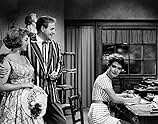Hans-Joachim Kulenkampff(1921-1998)
- Actor
- Writer
- Cinematographer
He graduated from high school in 1939 and then began training as an actor at the Deutsches Theater in Berlin. During the Second World War, Kulenkampff was sent to the front, where he was taken prisoner by the British towards the end of the war. Immediately after his release from captivity, Kulenkampff turned to acting. After his first appearances at theaters in Bremen, he took on roles at the "Theater im Zoo" in Frankfurt/Main. At the beginning of the 1950s, Kulenkampff also appeared as a radio presenter. He had been married to his wife Gertraud since 1948. In 1953 he began his unique career on television, where he hosted the quiz show "Who vs. Who?" moderated. However, Kulenkampff's real TV breakthrough came with his most successful show, which attracted a nationwide audience 82 times from 1964 to 1987 under the title "One Will Win". In addition to his television career, Kulenkampff never turned his back on the theater.
In 1981/82 he was seen in demanding roles on Munich stages, and in 1984 in a Detmold production of "Münchhausen". In 1987, Kulenkampff took part in a tour through the Federal Republic with a role in "In Doubt for the Defendant". In 1997, tours took him to several German stages. In the television sector, Kulenkampff's popularity was also increased by his roles in several TV films and series. He also moderated "Nachtthoughts", which marked the end of the ARD program from 1985 to 1990. In 1989, "Kuli" moved to RTLplus to moderate the less successful "Book Club", which was only broadcast until mid-1991 due to a lack of sufficient ratings. In the same year, however, the actor took part in a significant role in the RTL television play "The Great Freedom". The showmaster received numerous awards for his achievements, including the "Golden Screen" five times.
In 1965 and 1987 he was honored with the "Golden Camera". In 1992, Kulenkampff returned to public television with his show "Who knows why" produced for ZDF. In September 1992, he succeeded Wim Toelke as the presenter of the long-running program "The Grand Prize", from which he left in mid-1993 after public criticism. In 1997, Kulenkampff tried to make a comeback on television with the ambitious quiz show "Between Yesterday and Tomorrow": However, the Saturday evening program, which was placed in some third regional programs on ARD, also had to be canceled prematurely in March 1998. Shortly afterwards, the entertainer withdrew from the public due to cancer.
Hans-Joachim Kulenkampff died on August 14, 1998 in Salzburg.
In 1981/82 he was seen in demanding roles on Munich stages, and in 1984 in a Detmold production of "Münchhausen". In 1987, Kulenkampff took part in a tour through the Federal Republic with a role in "In Doubt for the Defendant". In 1997, tours took him to several German stages. In the television sector, Kulenkampff's popularity was also increased by his roles in several TV films and series. He also moderated "Nachtthoughts", which marked the end of the ARD program from 1985 to 1990. In 1989, "Kuli" moved to RTLplus to moderate the less successful "Book Club", which was only broadcast until mid-1991 due to a lack of sufficient ratings. In the same year, however, the actor took part in a significant role in the RTL television play "The Great Freedom". The showmaster received numerous awards for his achievements, including the "Golden Screen" five times.
In 1965 and 1987 he was honored with the "Golden Camera". In 1992, Kulenkampff returned to public television with his show "Who knows why" produced for ZDF. In September 1992, he succeeded Wim Toelke as the presenter of the long-running program "The Grand Prize", from which he left in mid-1993 after public criticism. In 1997, Kulenkampff tried to make a comeback on television with the ambitious quiz show "Between Yesterday and Tomorrow": However, the Saturday evening program, which was placed in some third regional programs on ARD, also had to be canceled prematurely in March 1998. Shortly afterwards, the entertainer withdrew from the public due to cancer.
Hans-Joachim Kulenkampff died on August 14, 1998 in Salzburg.

















